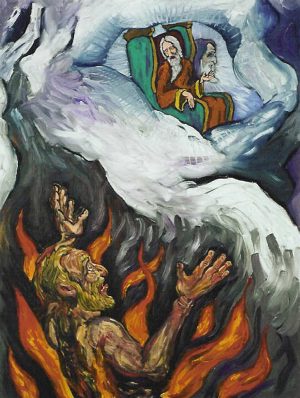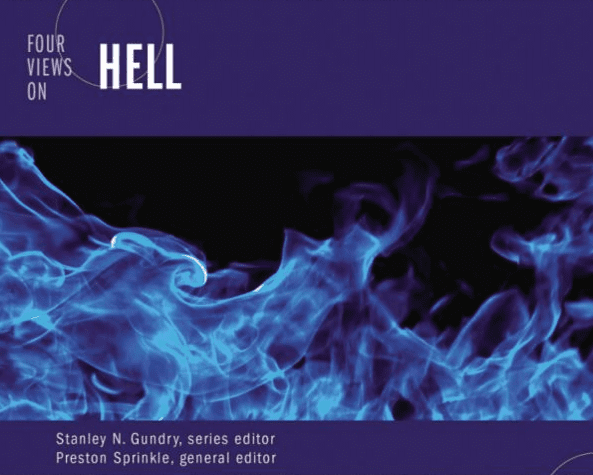A sermon by Jason Micheli, pastor at Aldersgate United Methodist in Alexandria, VA. Jason’s sermons are at the top of the list for me.
At the beginning of my ministry, I worked for a couple of years as a chaplain at the maximum security prison in Trenton, New Jersey. I enjoyed it. In a lot of ways, the Gospel makes more sense in a place like that than anywhere else.
But I didn’t enjoy everything about the job.
Part of my routine, every week, was to visit and counsel the inmates in solitary confinement.
It was a sticky, hot, dark wing of the prison. Because every inmate was locked behind a heavy, steel door, unlike the rest of the prison, the solitary wing was as silent as a tomb.
Whenever I think of Hell, I think of that place. But not for the reasons you might expect.
Whenever I visited solitary, the officer on duty was almost always a 50-something Sgt named Moore.
Officer Moore had a thick, Mike Dikta mustache and coarse sandy hair he combed into a meticulous, greased part. He was tall and strong and, to be honest, intimidating. He had a Marine Corps tattoo on one forearm and a heart with a woman’s name on the other arm.
If we weren’t in church, I’d also tell you he was a blank-hole.
So…you get the picture.
Whenever I visited solitary he’d buzz me inside only after I refused to go away. He’d usually be sitting down, gripping the sides of his desk, reading a newspaper.
I hated going there because, every time I did, he’d greet me ridicule.
He’d grumble things like: ‘Save your breath, preacher, you’re wasting your time.’
He’d grumble things like: ‘Do you know what these people did? They don’t deserve forgiveness.’ He’d grumble things like: ‘They only listen to you because they’ve got no one else.’
Once, when we gathered for a worship service, I’d invited Officer Moore to join us. He grumbled that he’d have ‘nothing to do with a God who’d have anything to do with trash like them’ and refused to come in.
Instead he sat outside with his arm crossed.
The locked prison door between us. About halfway through my time at the prison, Officer Moore suffered a near fatal attack; in fact, he was dead for several minutes before the rescue squad revived him. I know this because when he returned to work, he told me. Tried to throw it in my face.
‘It’s all a sham’ he grumbled at me one afternoon.
‘I was dead for 3 minutes. Dead. And you know what I experienced? Nothing. I didn’t see any bright light at the end of any tunnel. It was just darkness. Your god? All make believe.’
Even though I don’t put much stock in the light at the end of the tunnel cliche, that didn’t stop me from saying: ‘Maybe you should take that as a warning. Maybe there’s no light at the end of the tunnel for you.’ 
He grumbled and said: ‘Don’t tell me you believe in Hell?’
‘What makes you think Iwouldn’t believe in Hell?’ I asked.
‘You actually believe in it?’ he asked, as though I’d surprised him for the first time.
‘Well, Jesus talks about Hell,’ I said, ‘more than the rest of the Bible combined.’
‘Oh, and since I don’t believe in your Jesus, I’m going to Hell? Is that it?’
He pushed his chair back and fussed with his collar. He suddenly seemed uncomfortable.
‘When Jesus talks about Hell,’ I said, ‘he doesn’t say anything about unbelief. It would be easier if he did. Jesus talks about Hell, he talks about people with contempt towards their neighbors, religious people who are gossips and hypocrites, people who refuse to help those in need. Those kinds of people.’
Officer Moore stared at me. ‘So what the Hell’s Hell like then?’ he asked, smirking. ‘Fire and brimstone, I mean, really?’
‘No,’ I said, ‘fire, brimstone, gnashing of teeth, those are probably all metaphors.’ He let out a sarcastic sigh of relief. So then I added: ‘They’re probably metaphors for something much worse.’ That got his attention. ‘I’ve got a book you should read sometime,’ I said and walked to the first cell.
———————————————–
During the course of my ministry, I’ve met far too many people who’ve been hurt by Christians who spoke callously or cavalierly about Hell.
That’s the last thing I want to do.
So today I want to be uncharacteristically restrained and non-confrontational.
Sort of. I say sort of because I also know that for most of you, like for most middle and upper class Christians in America, Hell is an absurdity. You tell people to go to Hell, but you don’t actually believe in it. So today I want to be uncharacteristically straightforward. No sarcasm or jokes, sorry. I don’t want to give you another reason to think the doctrine of Hell is just an absurdity.
Now, it can be misleading to say ‘the doctrine of Hell’ because within the Christian tradition there are a variety of perspectives.
What I want to do today is walk you through three of the primary ways the Christian tradition has conceived of Hell. I want to point out the strengths and problems in each view, and then I want to offer you what I think Jesus is trying to teach us when he teaches about Hell.
——————————————————————–
 The first way the Christian tradition has thought about Hell is the one you’re all acquainted with: Hell as Eternal Punishment.
The first way the Christian tradition has thought about Hell is the one you’re all acquainted with: Hell as Eternal Punishment.
God takes the sinner. Throws them into Hell. And locks the doors. Forever.
In this view, Hell is physical and spiritual anguish.
As the rich man in Jesus’ parable begs: ‘Cool my tongue for I am in agony…warn my brothers so they don’t come into this torture chamber.’
And in this view, Hell is endless. You never escape. You can never repent. And you never perish.
This is Dante’s image of God’s inferno, where the message above the doors to Hell read: ‘Abandon all hope.’
Now, I can tell from the looks on your faces that this is the view of Hell you best know and most resist. You can feel the problem in this view even if you can’t articulate it.
It’s a moral problem. It’s hard to imagine the god who died for us turning around and turning us over to perpetual torment?
And the word perpetual gets at the problem. There’s a problem of proportion. Even the very worst of human sin is finite. That it should meet with infinite punishment is disproportionate.
The graphic imagery of this view of Hell can lead to caricature, and it’s easy to dismiss a caricature.
But notice. Who doesn’t seem to object to the idea of Hell as punishment? Lazarus.
Notice too- the rich man knows Lazarus’ name; therefore, he must’ve known Lazarus’ suffering.
And the rich man did nothing.
And Lazarus died.
Lazarus isn’t gleeful over the rich man’s punishment, but neither is he troubled by it.
Behind all the Medieval exaggeration, what this view of Hell is trying to proclaim is God’s promise that one day he will judge sin and evil and set things right.
Of course, people tell me all the time ‘I believe in a God of love; I don’t believe in a God of Judgement.’ But before you completely brush aside the notion of a Judgmental God, listen to this. It’s from Miroslav Volf. He’s a theologian from the Balkans and in the ‘80‘s he was tortured for being a Christian:
“If God were not angry at injustice, God would not be worthy of our worship. The practice of Christian nonviolence requires the belief that God will one day judge. If you disagree, I suggest imagining that you are in a war zone (which is where my paper was originally delivered). Among your listeners are people whose cities and villages have been first plundered, then burned, whose daughters and sisters have been raped, whose fathers and brothers have had their throats cut.
Imagine telling them that they should not punish their enemies because God does not judge or punish. Soon you would discover that it takes the quiet of a suburban home to insist that an all-loving God does not judge or punish. You would do well to reflect about many other pleasant captivities of the liberal mind” (Exclusion and Embrace, 303).
——————————————————————-
The second view of Hell is Annihilation. 
Rather than God throwing people into Hell and locking the door closed behind them.
Picture instead God throwing open the doors of his Kingdom and saying: ‘Get out of here. Leave’
This understanding of Hell recognizes that scripture’s imagery for Hell is…imagery. Annihilation isn’t about physical punishment. God instead judges by saying to the sinner: ‘Depart from me.’ And because it’s in God’s presence that we live and move and have our being, once the judged sinner departs from God’s presence they simply cease to exist. Poof.
You can think of how the rich man in the parable no longer has a name after he dies. Whereas in life the rich man probably had thousands of Twitter followers, in death as he departs from God’s presence he loses his name and eventually his very self. He’s in the process of disintegration.
The strength of this view is that it holds onto the biblical importance of God’s justice while avoiding the nasty visual of God tormenting sinners endlessly.
The problem with this view of Hell, however, is God’s sovereignty. If God is all-powerful and God desires to share fellowship with us in God’s New Creation then how is it that some are lost forever? How is it that the Sovereign, all-powerful God fails?
———————————————————
A third way of viewing Hell is, functionally, a denial of it:Universalism. 
Universalism pictures a Hell where the doors are never closed.
Although Universalism has always been considered a heresy, it has just enough Gospel-logic to it that it’s never died away. In other words, God created all of us. God called Israel to be a light to all nations. God so loved all the world that he took flesh in Jesus, and while we were sinners Jesus died for all of us. Therefore, ultimately God will get what God wants. All will be saved.
You could point to the parable today- how it shows a chasm between the rich man and Heaven but even still the rich man doesn’t appear to be permanently lost to God. The rich man can see Heaven and speak to Abraham. And it’s true the rich man is punished, but it’s not clear that he’s damned. Abraham calls the rich man: ‘My son…’
Despite being a heresy, Universalism persists because it points out what the Eternal Punishment view frequently obscures: the allnessof what God desires. But the problem with Universalism is that it emphasizes what God desires at the expense of what we desire. God’s grace in this view is so irresistible it is, in fact, coercive. In the End, ultimately, we’re not free. We can’t freely choose NOT to choose God. Our loving relationship with God then is more like an arranged marriage.
———————————————————–
Those are three ways the Christian tradition has viewed Hell. In the end, I believe all three of them are inadequate.
Here’s why: Christians believe that in Jesus Christ’s death and resurrection, God has defeated Sin, Death and the Devil once and for all, it is finished- that’s why I never talk about the Devil.
Christians believe Jesus suffered for us, took our punishment on himself, descended all the way into Hell to experience the forsakenness due us.
So to say God chooses to send us to Hell is to suggest that there’s something God did not accomplish in Jesus, something God did not defeat on the Cross. And that’s the glaring theological problem with the three traditional views of Hell. The premise, the assumption, behind each of them is that Hell must be something God chooses for us.
But, in scripture, especially in Jesus’ teachings, Hell is something we choose for ourselves. And that’s scarier than pitchforks and gnashing teeth.
It’s not that God needs to be reconciled to us. He does that on the Cross.
Hell is our refusal to be reconciled to God. Hell is something we choose.
Look at the parable. The rich man doesn’t ask to get out. He doesn’t repent. He doesn’t beg for mercy. Like an addict, he denies the reality and severity of his situation. He shifts the blame: ‘Abraham, warn my brothers so they won’t end up here too.’ Meaning: I didn’t get a fair shake; I don’t deserve to be here. What’s the first thing the rich man says? ‘Send Lazarus down here to wait on me.’ The rich man’s not trying to get out of Hell. He’s just trying to get Lazarus in. He still sees Lazarus as beneath him. Who he chose to be on Earth is now all he is in Hell. He’s just a ‘rich man.’ 
The rich man made himself the Lord of his life. He loved himself more than he loved God. He lived his life as though the world revolved around him just as a Kingdom revolves around a King.
Imagine if the rich man were in God’s New Creation where God is Lord and King. If the rich man were in heaven, heaven would feel like Hell to him. He’d be in agony. As Orthodox Christians say, the ‘wrath of God’ is only how those who reject God experience God’s love.’ To those who turn their back against God, heaven feels like hell.
Could God forgive the rich man’s sin and welcome into heaven? Of course. God already forgave him. On the Cross.
But would the rich man choose heaven?
Even in Hell he doesn’t choose it.
The question people always want to ask is:
Is it possible for God to forgive Hitler and Stalin and let them into Heaven?
But that gets it all backwards.
The better question is:
Would they choose Heaven?
The still better question is: Would we?
And this isn’t just abstract speculation about where we’ll spend eternity. No, whenever the bible teaches about eternal life it does to call attention to your present, earthly life.
I know enough about enough of you to know that this where you should pay attention:
The flames of Hell that scripture speaks of- Jesus is trying to show us how those flames burn within each of us.
Within each of us there is something:
anger, resentment, contempt, greed, self-love, self-loathing
that if we don’t put it out, if we don’t ask God to extinguish it,
it can consume us.
In this life.
And into the next.
If you don’t believe me or know what I’m talking about, ask any divorced person in this room what it’s like to have such anger it nearly burns your life down.
————————————————
A few days after our conversation about Hell, I left in Officer Moore’s mailbox a copy of a book, C.S. Lewis’ The Great Divorce.
It’s a fable about the residents of Hell taking a bus trip to Heaven. They’re given the option to stay but, one by one, they choose to turn and go back.
I had dog-eared some pages and highlighted some text for Officer Moore, hoping we could talk about it the next time I saw him.
Specifically, I highlighted these words:
Hell begins with a grumbling mood, always complaining, always blaming others . . . but you are still distinct from it. You may even criticize it in yourself and wish you could stop it. But there may come a day when you can no longer. Then there will be no you left to criticize the mood or even to enjoy it, but just the grumble itself, going on forever like a machine. It is not a question of God ‘sending us’ to hell. In each of us there is something growing, which will BE Hell unless it is nipped in the bud. In the end, there are only two kinds of people: those who say to God, ‘Your will be done,’ and those to whom God says, ‘Your will be done.’
I left the book in his mailbox.
A week later I went to solitary to see if he wanted to talk.
As always he refused to buzz me in but this time when I mentioned I was there to talk to him, he didn’t give in. He wouldn’t let me in.
I asked if he read the book.
Not saying anything, he got up and walked to the entrance door, his body was one big snarl.
He slid the book between the bars.
‘A whole lot of nonsense’ he grumbled at me.
And then he told me to go the Hell away.
————————————————
Here’s what Jesus wants you to realize:
In this life and the next,
Hell is prison where the doors are locked from the inside.











